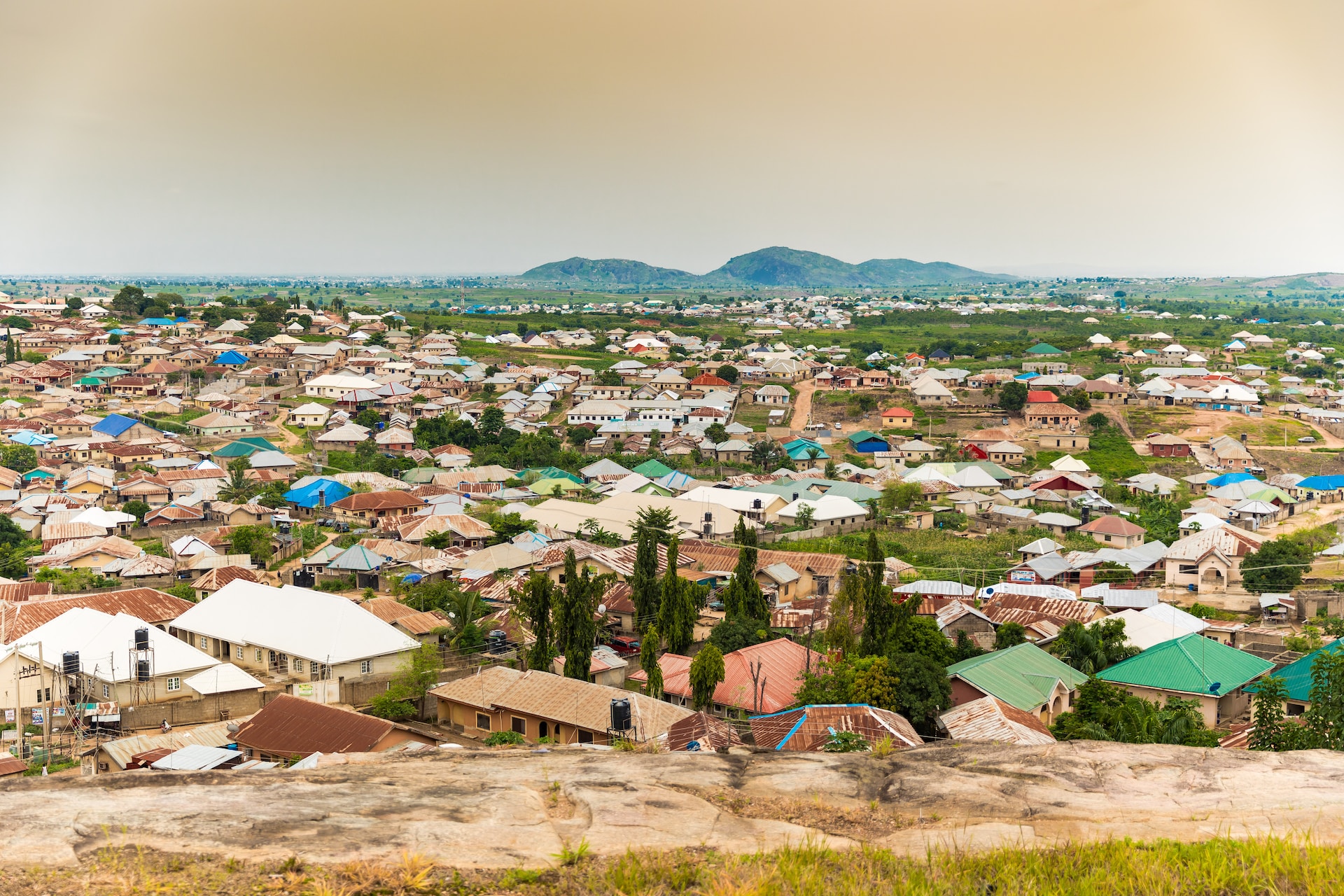- Official language: English
- Time Zone: GMT+1
- Climate: Tropical
- Calling Code: +234
- Electricity: 230 V / 50 Hz; type D and G plugs
- Capital City and US Embassy: Abuja
- Currency: Nigerian naira (₦; NRN)
Your Comprehensive Guide to Obtaining a Nigerian Visa
Whether you want to explore off-the-beaten-path national parks for wildlife sightings, feel the thrill of multicultural cities, or collaborate in the booming industries that make up Africa’s biggest economy, you’ll find it in Nigeria.
Located on the Gulf of Guinea in West Africa, this country of warm and welcoming residents is an often-overlooked destination for African travel, but it’s ready to wow with its mix of cosmopolitan cities, peaceful national parks, and melting-pot heritage of Muslim, Christian, and Indigenous cultures.
The country’s vibrant cities, like Lagos and Abuja, offer a unique mix of modern skyscrapers, bustling markets, and lively nightlife. Historical sites, like the ancient city of Ife and the UNESCO-listed Sukur Cultural Landscape, provide a glimpse into Nigeria’s storied past and diverse cultural heritage.
Nature enthusiasts can explore the lush forests of Cross River National Park or marvel at the awe-inspiring Zuma Rock. For business travelers, Nigeria is a boon as well. Home to Africa’s biggest economy, many major industries have solid footholds here including oil and mining.
Whether you’re coming to Nigeria for work or tourism, here’s everything you need to know to plan your trip, from how to get visas to cultural customs.
- Essential Travel Information to Visit Nigeria
- Do US Citizens Need a Visa for Travel to Nigeria?
- Nigeria Visa Requirements for US Citizens
- General Travel Requirements to Enter Nigeria
- Nigeria Travel Restrictions
- Health and Safety in Nigeria
- Local Laws for Travelers to Nigeria
- Money, Banking, and Currency in Nigeria
- Preparing for Your Nigeria Trip
Essential Travel Information to Visit Nigeria
Do US Citizens Need a Visa for Travel to Nigeria?
With the exception of the business travel visa upon arrival option, yes, US citizens are required to have an entry visa to visit Nigeria.
Whether you’re traveling to Nigeria for work or pleasure, Entriva is here to make your visa application process as simple, straightforward, and hassle-free as possible. Here are some common types of Nigerian visas available through Entriva.
Nigeria Visa Requirements for US Citizens
First and foremost, US citizens traveling to Nigeria need to have an official passport valid at least six months beyond your intended date of travel. It should also have at least two blank pages for visa stamps. You also need a valid visa relevant to your type of travel.
Nigeria Tourist Visa
With a small visa fee and completed application form, you can obtain a paper F5A Tourist Visa to visit Nigeria for tourism purposes for up to 30 days.
Nigeria Business Visa
The F4A or F4B Business Visa is a single or multiple-entry visa for business travel to Nigeria, permitting stays of 30 to 90 days for foreign citizens.
It’s also possible to visit Nigeria for business travel and get a visa upon arrival. However, you’ll need to obtain a visa-on-arrival approval document prior to travel. You can either visit a Nigerian embassy or consulate or apply online via the Nigeria Immigration Service. After you’ve filled out the online application form and paid the visa fees, be sure to print out your receipt—you’ll be required to show it, as well as an acknowledgement (or visa payment) slip, when you arrive at customs.
General Travel Requirements to Enter Nigeria
Along with your valid passport and visa, the Nigerian government requires visitors to show proof of vaccination against yellow fever and polio to the relevant official. When entering and leaving the country, you’ll also need to fill out entry and exit documents.
Nigeria Travel Restrictions
COVID-19 Restrictions: None.
The US Centers for Disease Control and Prevention (CDC) recommends that travelers be up-to-date on their COVID-19 vaccines. Before traveling, consult the Nigerian Ministry of Health and the CDC for any updated health and safety advisories. All incoming passengers to Nigeria are required to fill out a health declaration form, either upon arrival or online in advance.
Due to “crime, terrorism, civil unrest, kidnapping, and armed gangs,” the US State Department has a Level 3 Travel Advisory set for Nigeria, strongly encouraging US travelers to reconsider travel. There is a Do Not Travel warning for certain areas as well, including Borno, Yobe, Kogi, Sokoto, Zamfara, Delta, and Enugu states.
The CDC has also posted several health notices for travel to Nigeria. There are Level 2: Practice Enhanced Precautions alerts for diphtheria, global polio, and yellow fever and a Level 1: Practice Usual Precautions alert for global measles.
For more up-to-date information about travel restrictions to Nigeria, check Entriva’s travel map, or with the US CDC, State Department, and/or embassy and consulates in Nigeria.
Health and Safety in Nigeria
Due to Nigeria’s poor healthcare system, travelers should take precautions to keep themselves healthy during their travels. Before traveling, be sure to get any required and recommended vaccinations for protection against common illnesses, like malaria and yellow fever.
Insect-borne diseases are a widespread concern in Nigeria, so protect yourself by wearing long clothing, using insect repellent, and sleeping under mosquito nets. Travelers should also avoid drinking tap water and avoid going outside (or use masks) during the seasonal Harmattan dust storms.
Nigeria is currently a high-risk destination due to rising rates of crime, kidnapping, and terrorism throughout the country, but particularly in the northwestern, northeastern, and coastal areas. Travelers should avoid dangerous areas and take precautions like staying in at night, even in major cities like Lagos.
Local Laws for Travelers to Nigeria
Nigerian citizens aren’t the only ones subject to local laws. There are many regulations travelers should be aware of as well, such as restrictions against photographing military installations, drinking laws in the Muslim-majority north, and smoking in public. LGBTQ+ travelers should know that homosexuality is outlawed in Nigeria and take measures to keep themselves safe.
If you’re arrested in Nigeria, alert your country’s embassy and seek the services of a reputable lawyer or law firm for assistance. Breaking the law in Nigeria can come with hefty fines and imprisonment, so you want to stay on the right side of the law during your travels.
Money, Banking, and Currency in Nigeria
In Nigeria, cash is still king. As a primarily cash-based economy, you’ll be using Nigerian naira for all your financial transactions. Learn more about where to safely get naira, tipping etiquette, and other money questions in our money, banking, and currency guide to the Nigerian naira.
Preparing for Your Nigeria Trip
Obtaining the proper visa is an essential part of planning your trip. At Entriva, we can easily and efficiently help you with every aspect of getting a Nigerian visa online. Start your visa application process.




